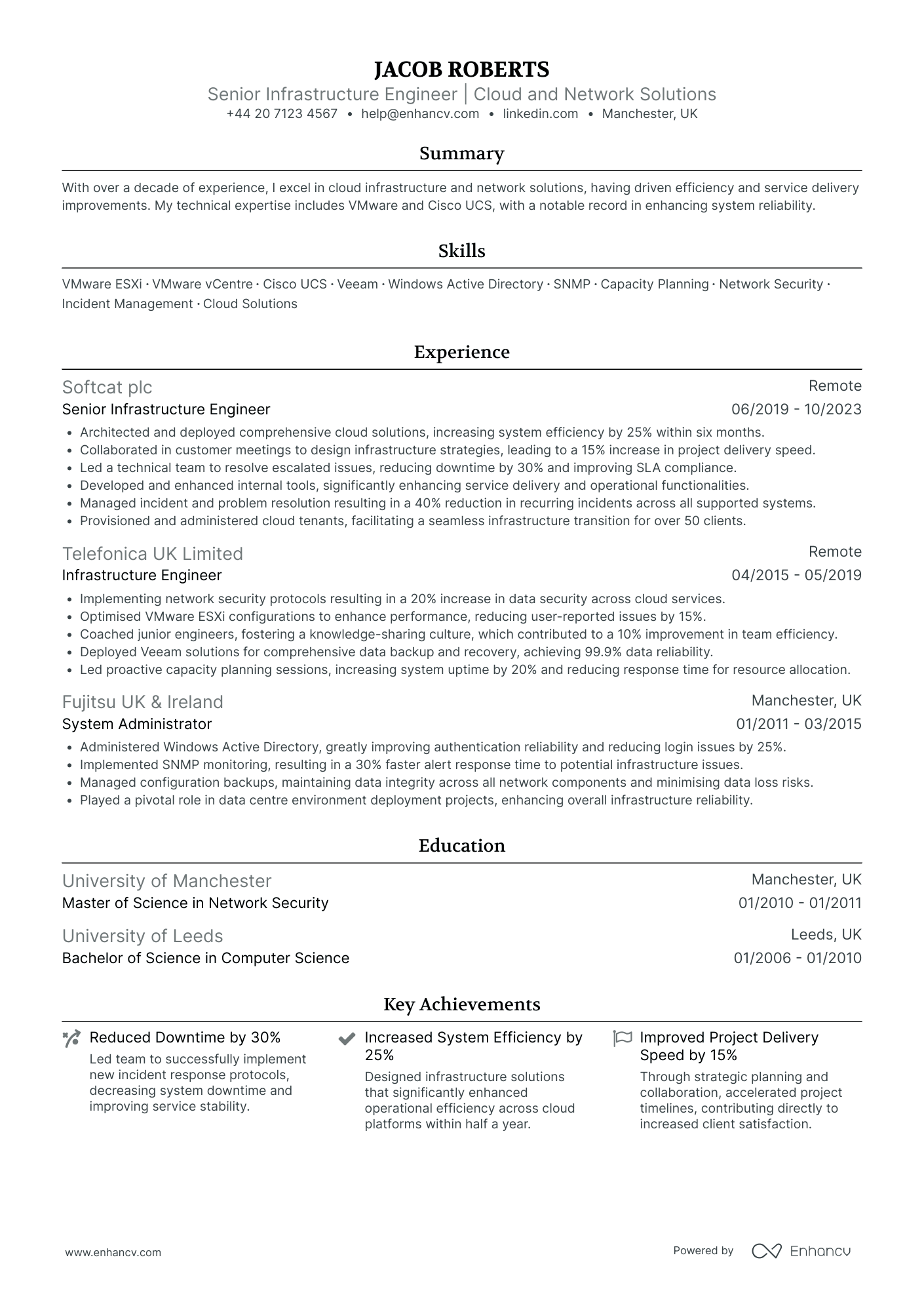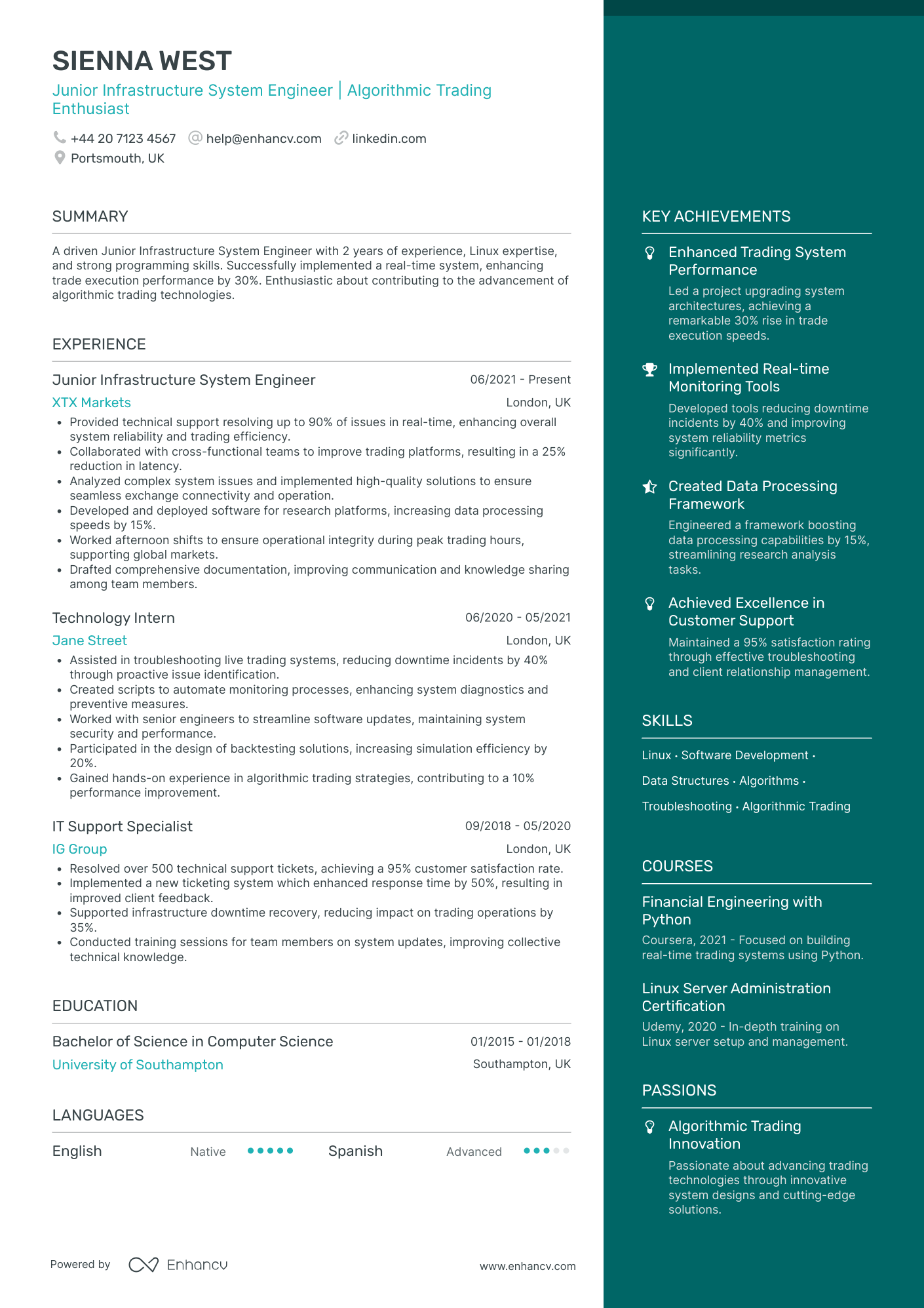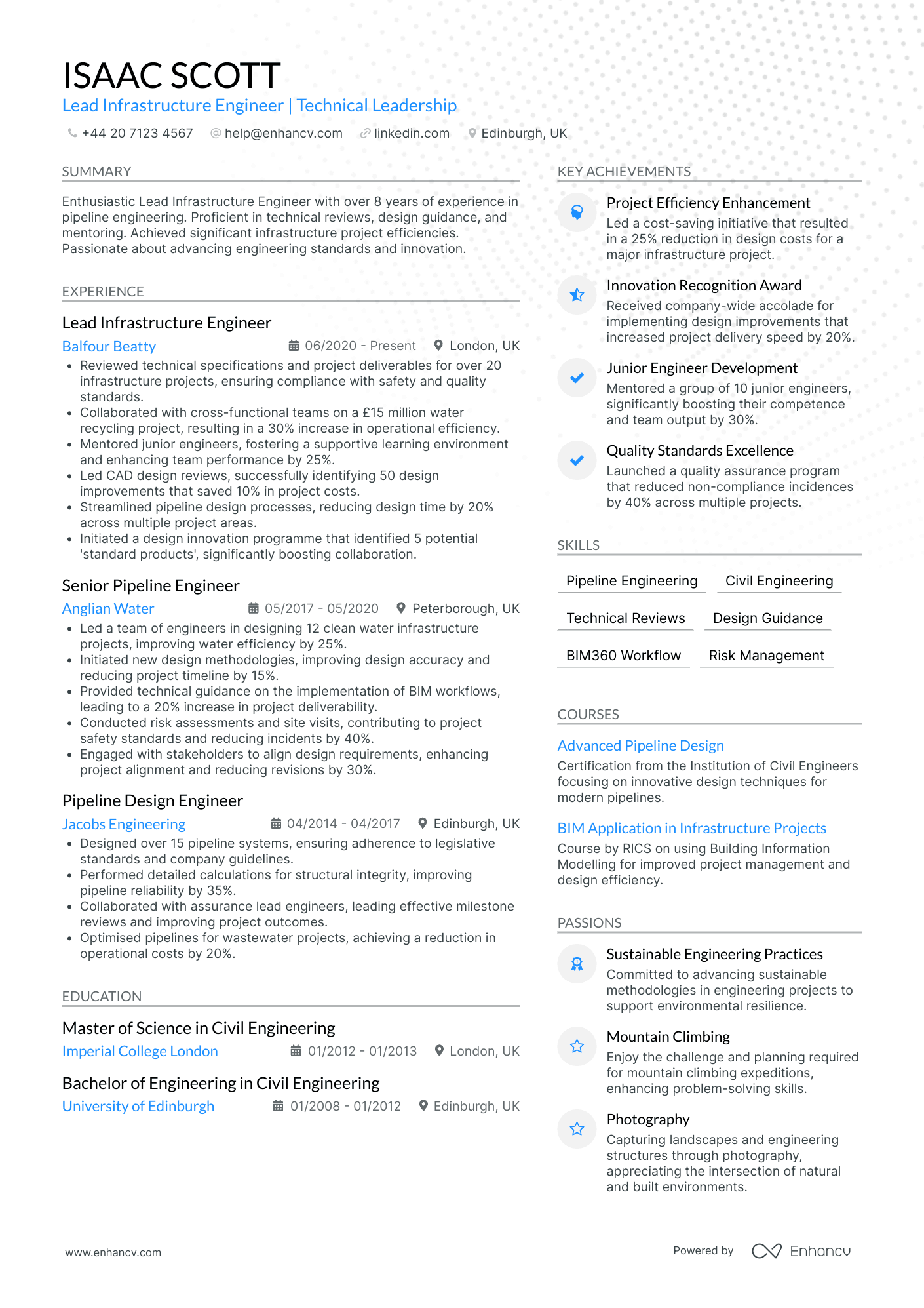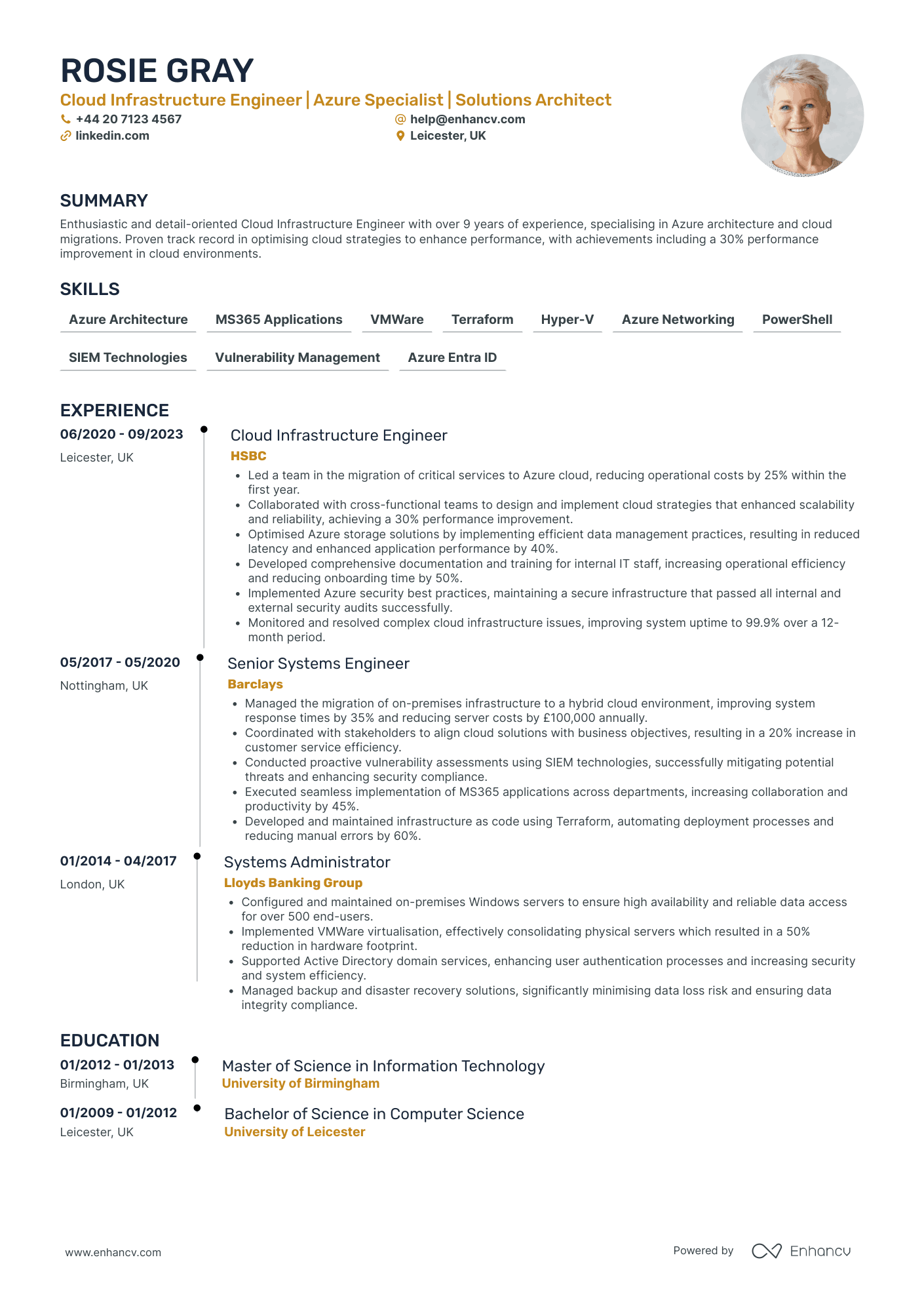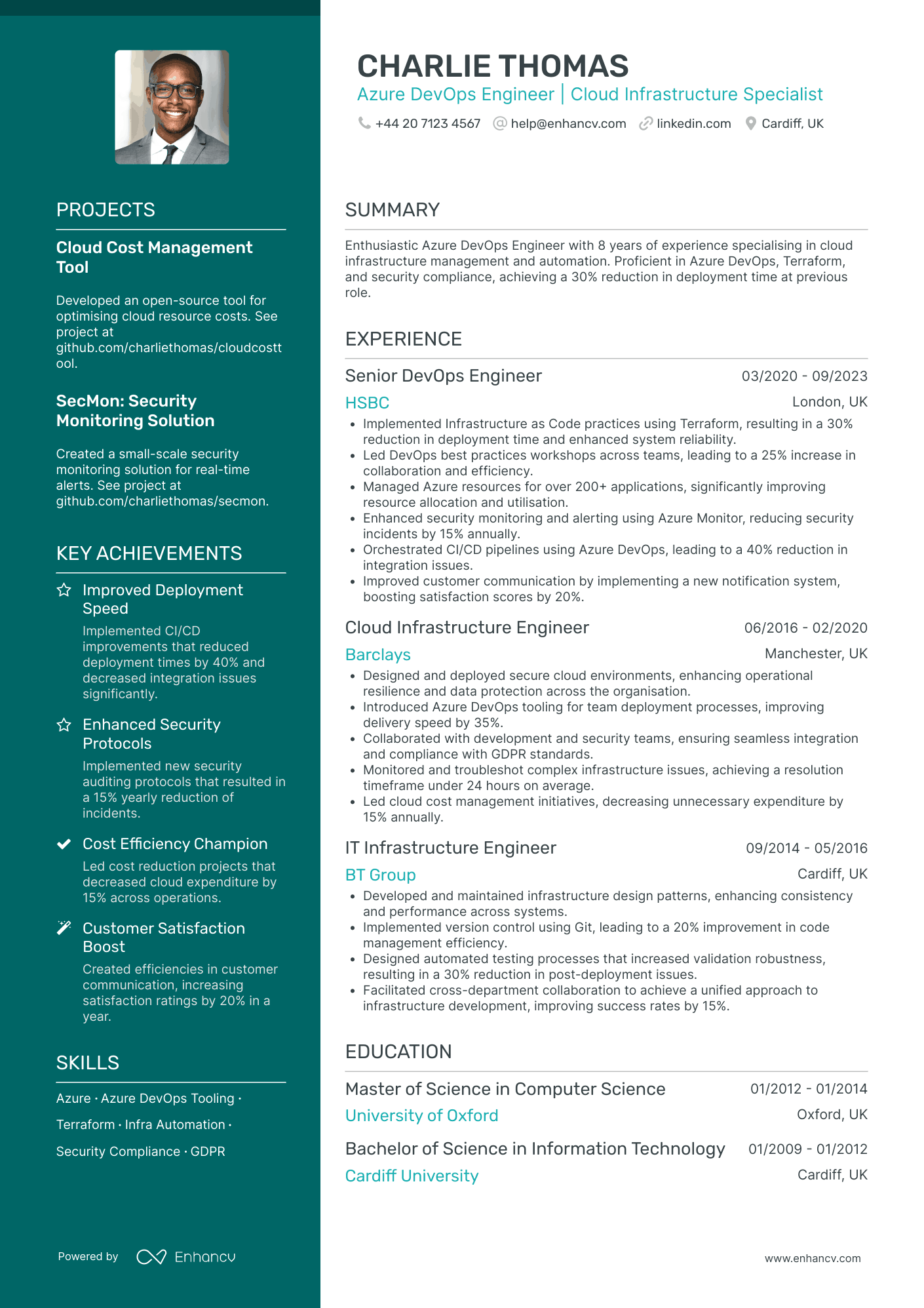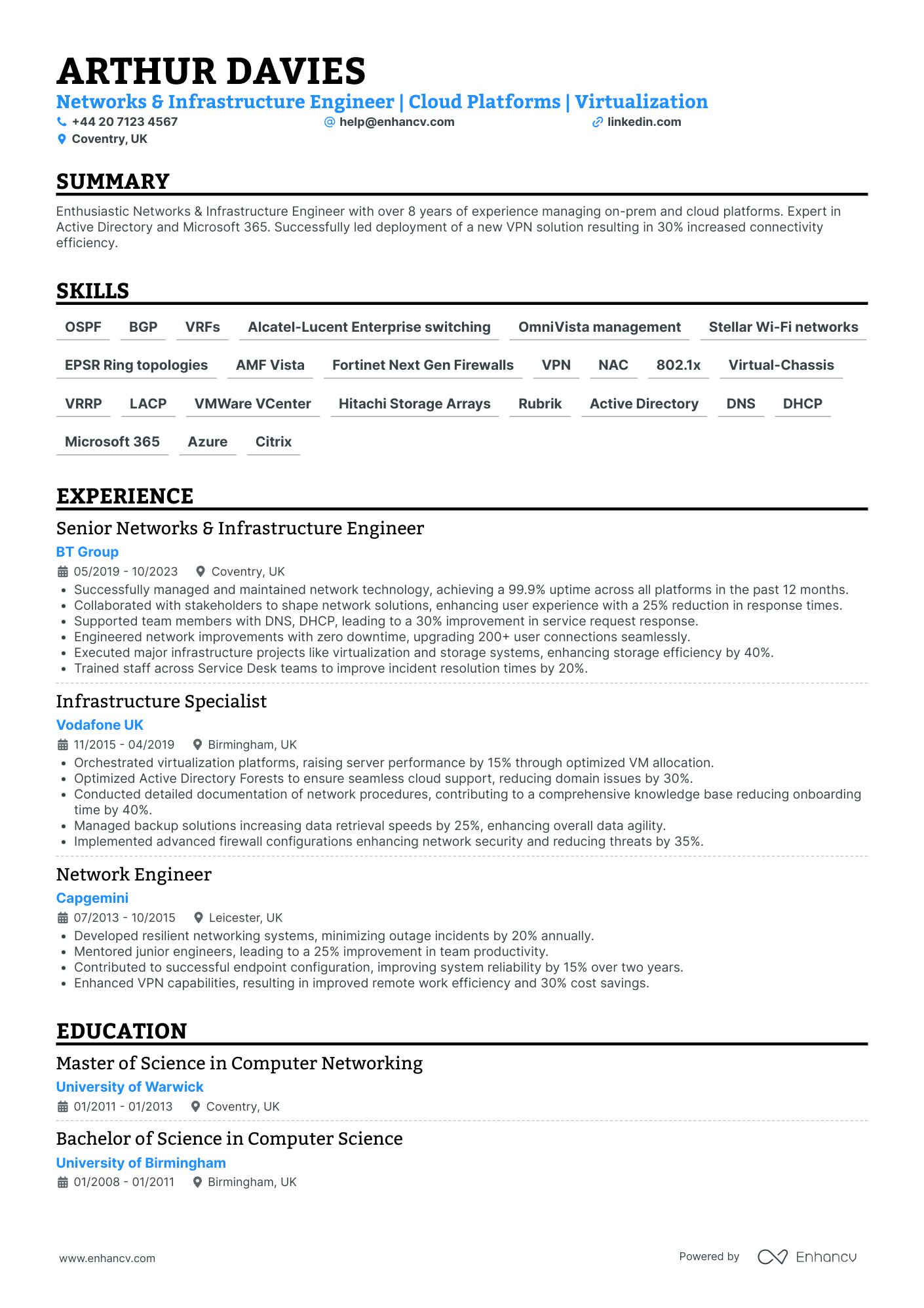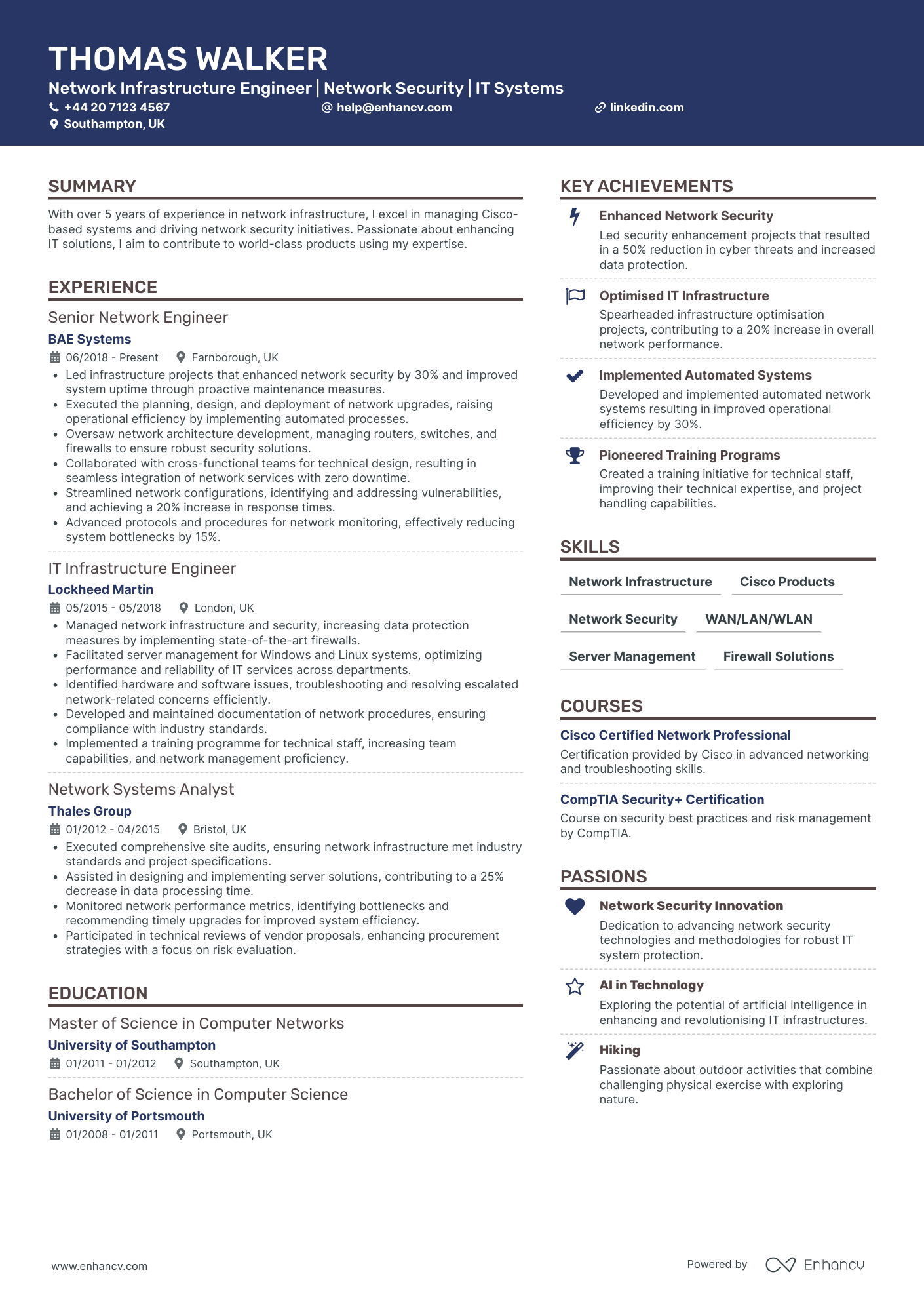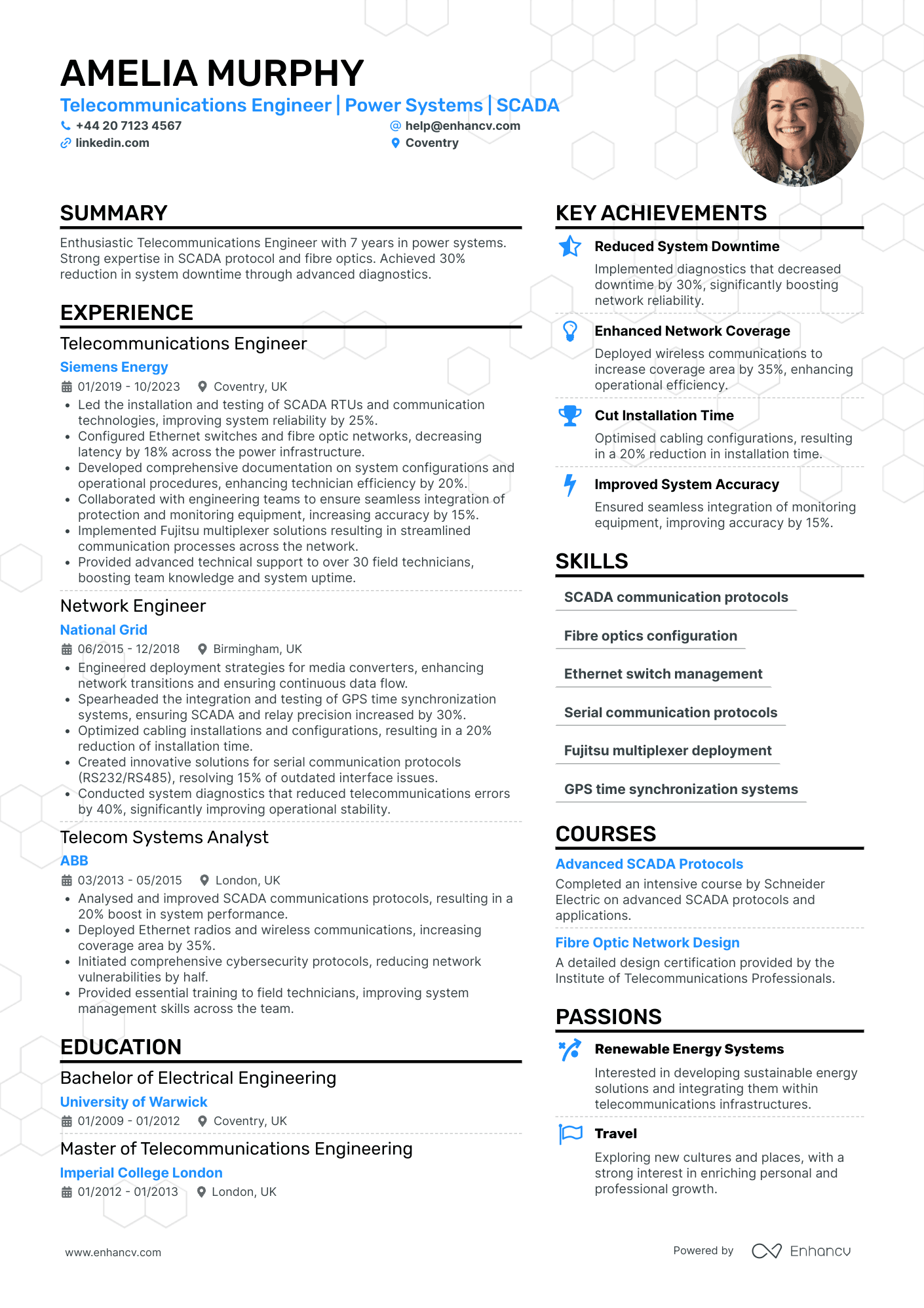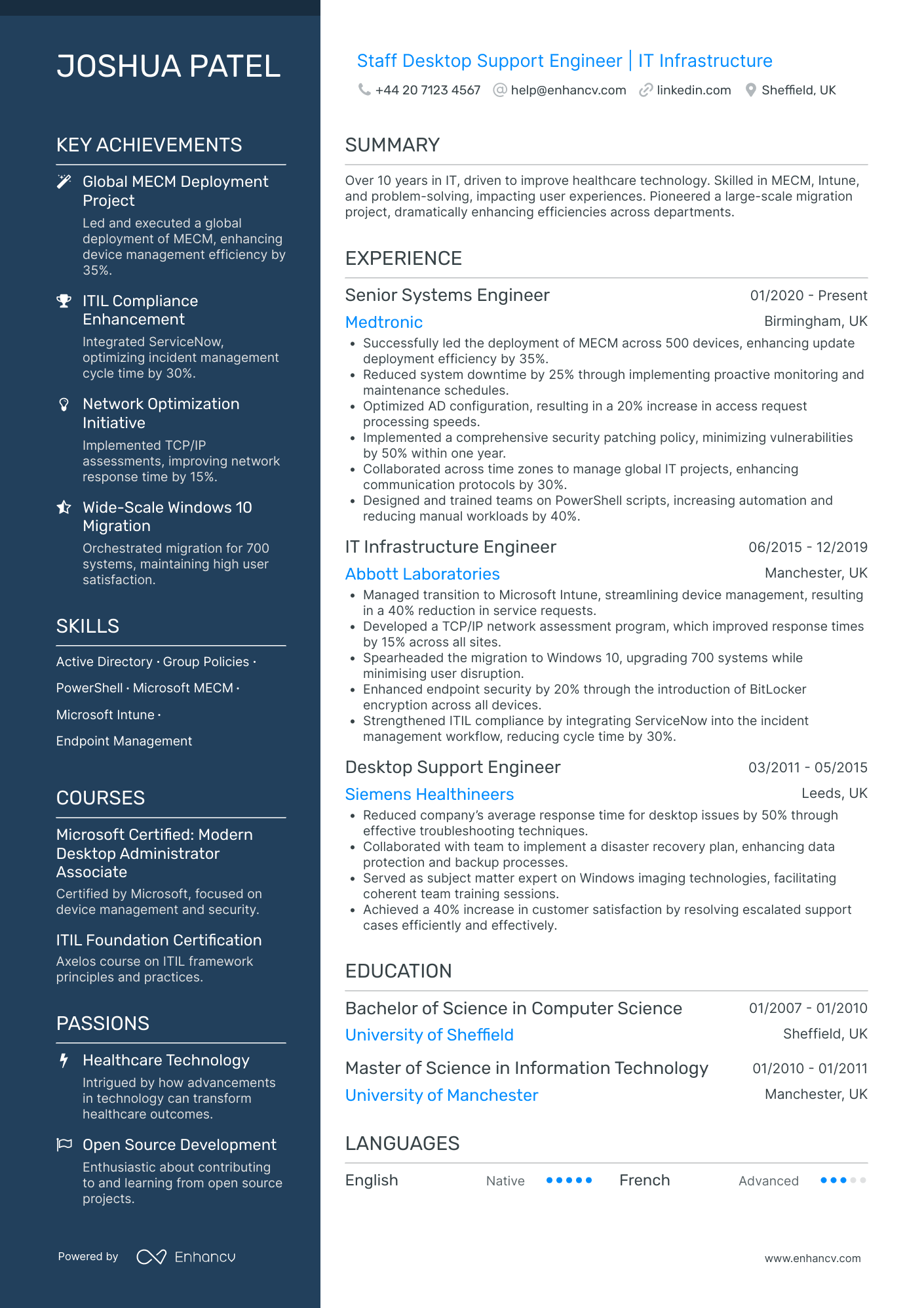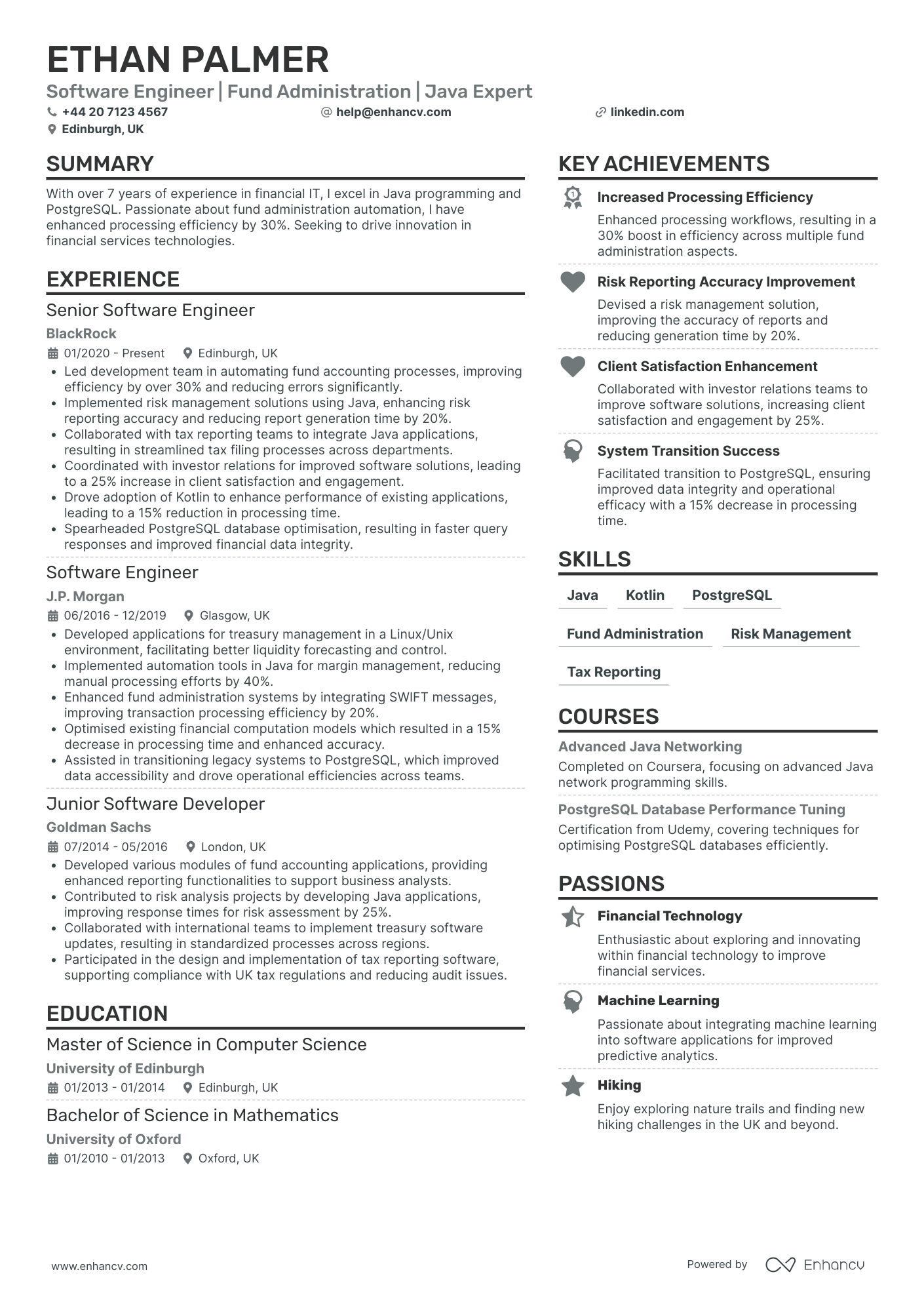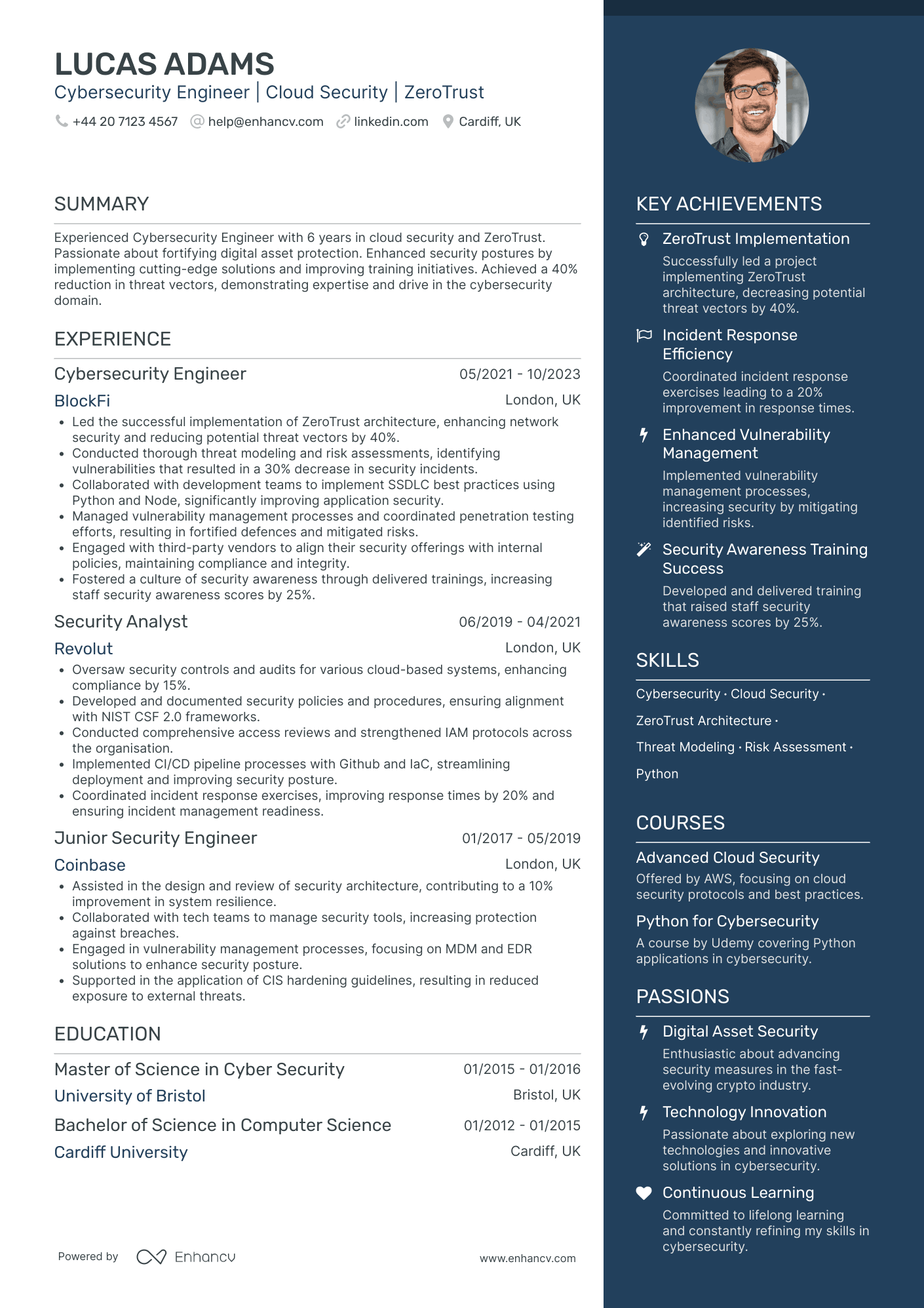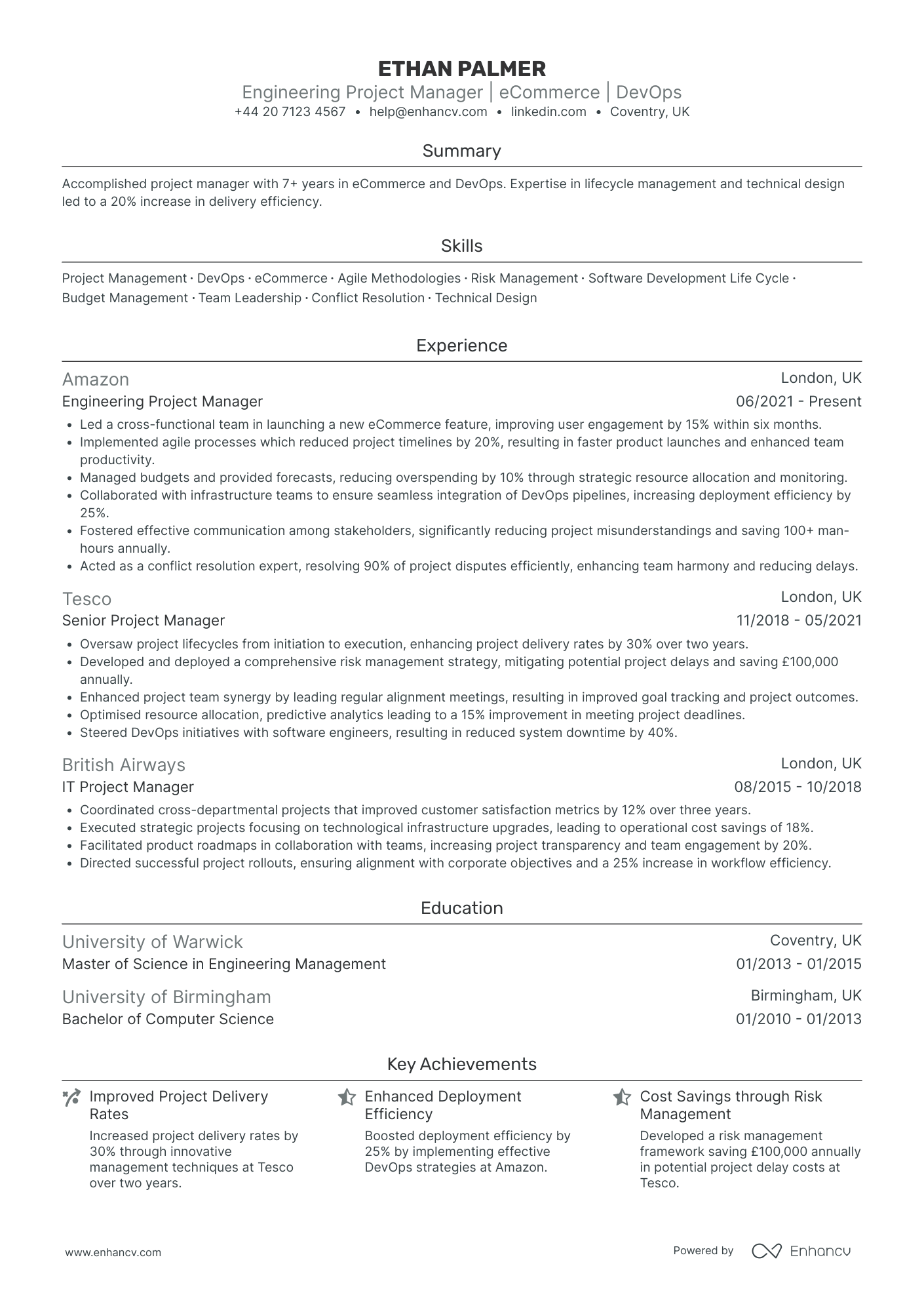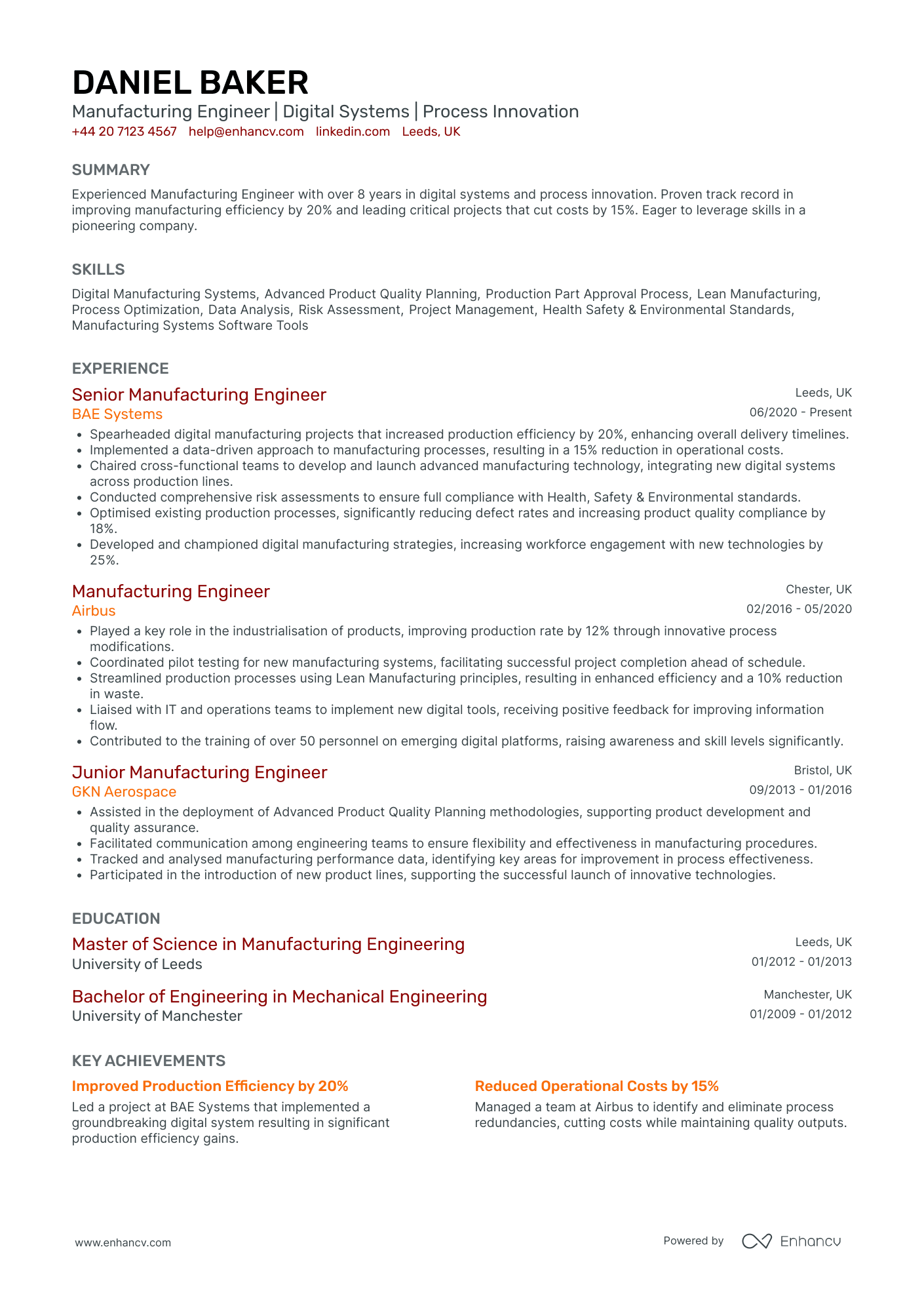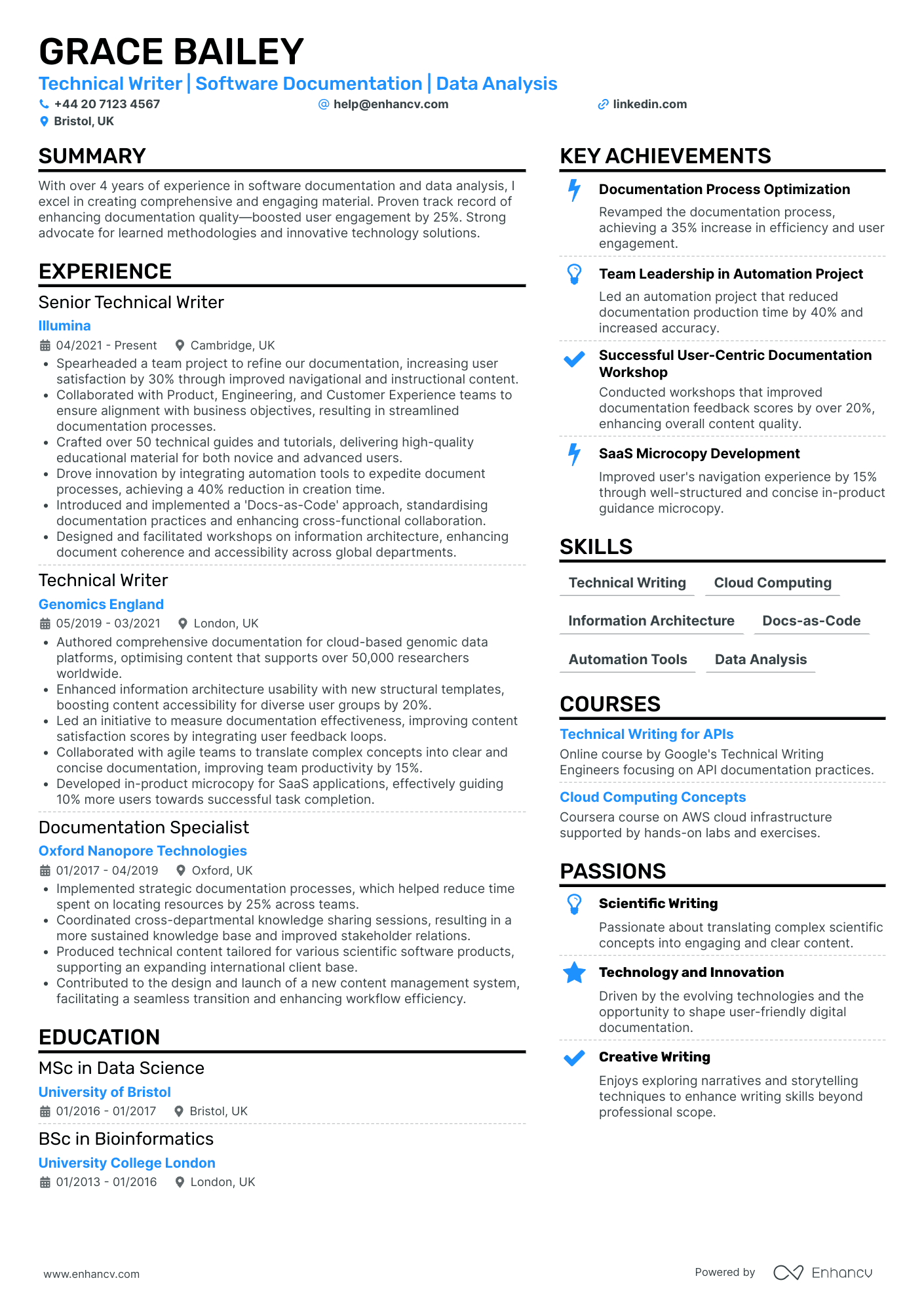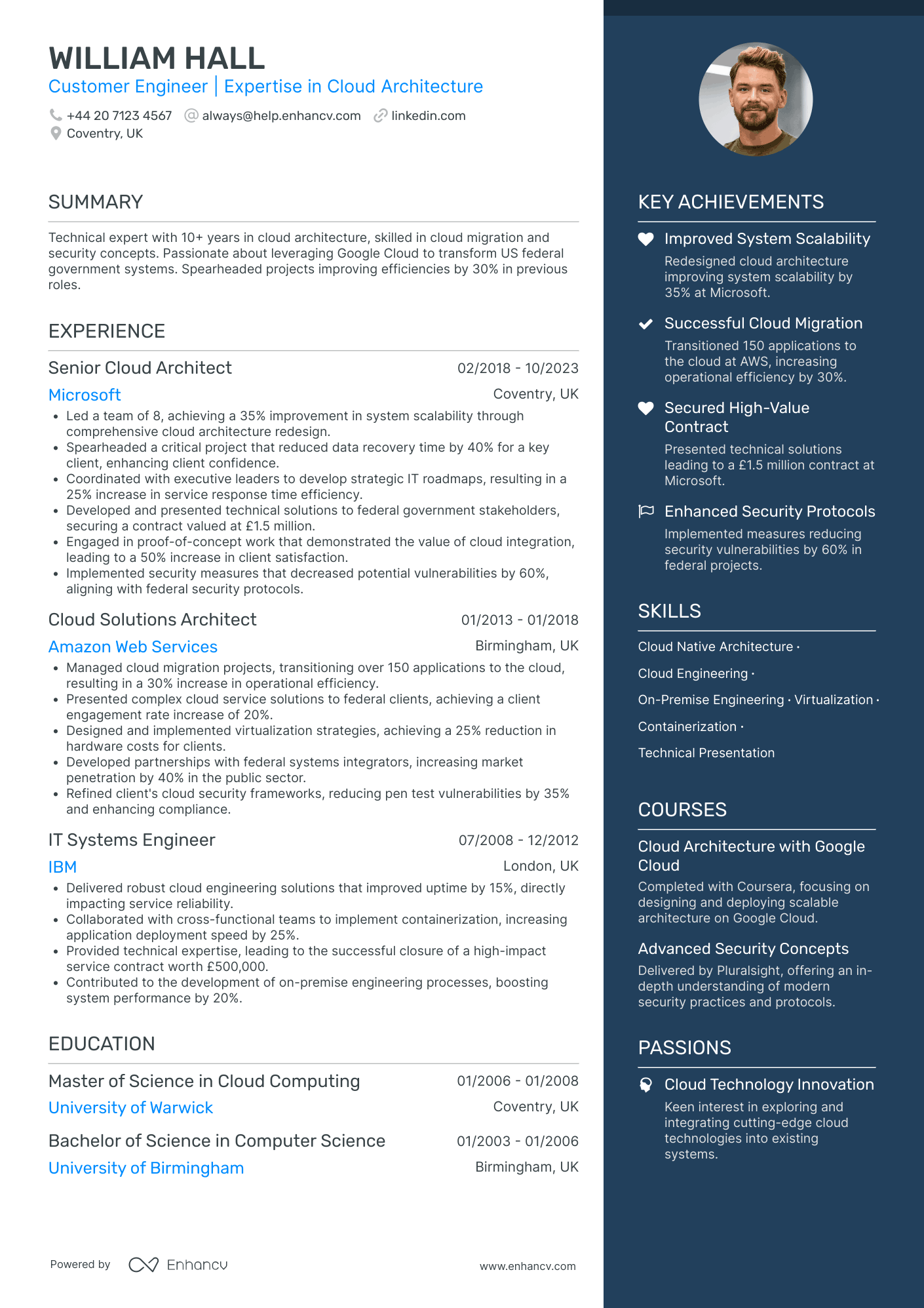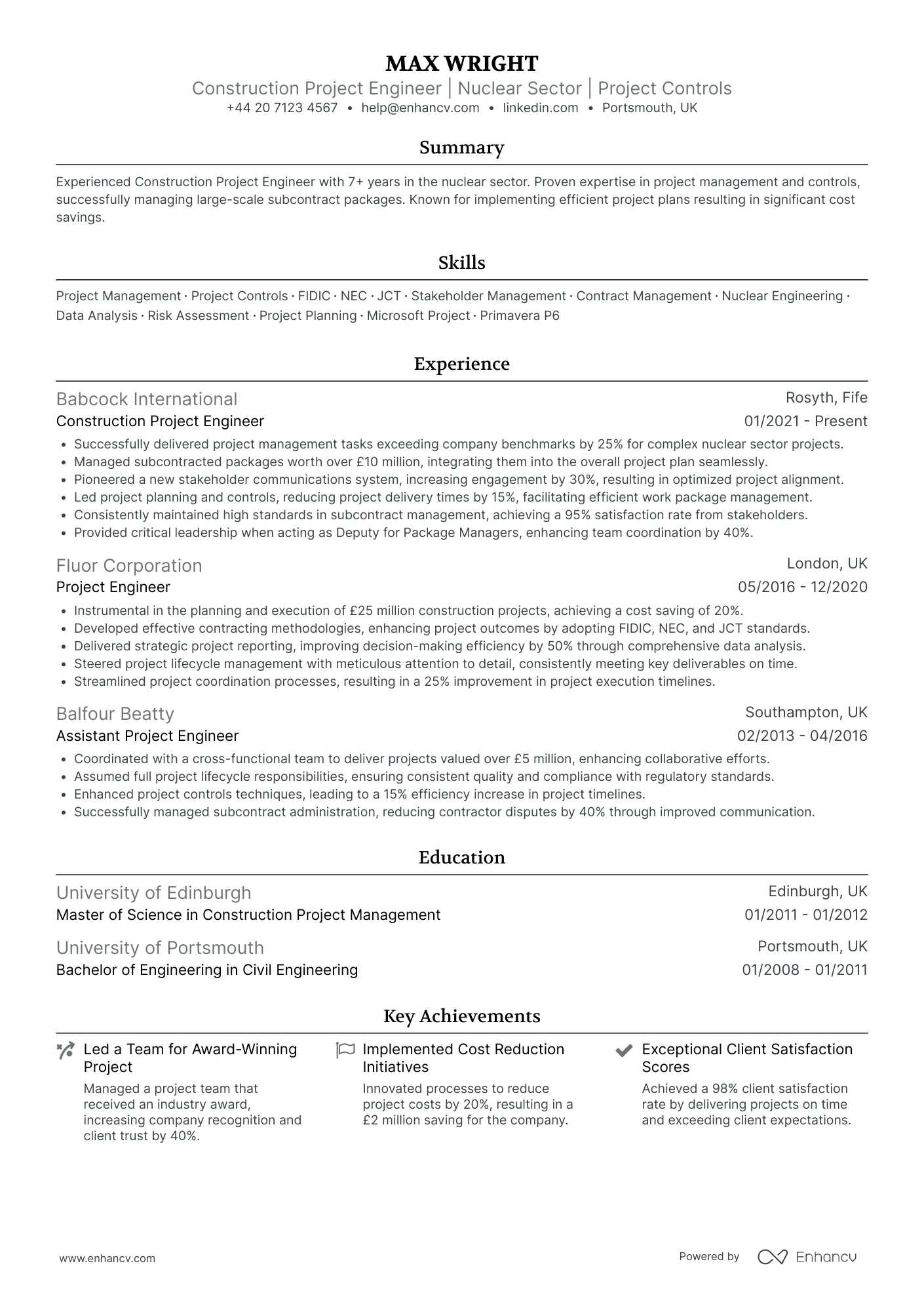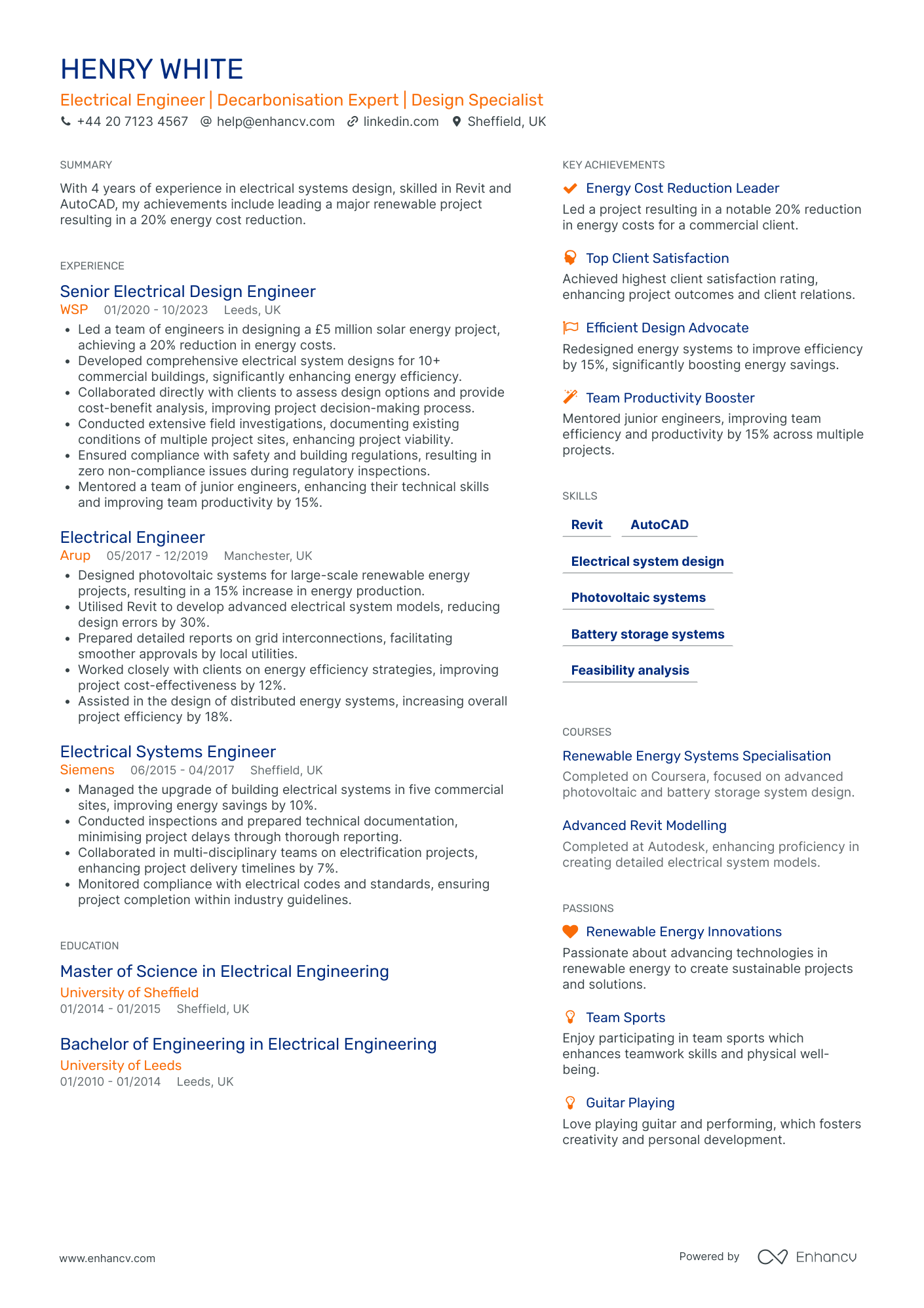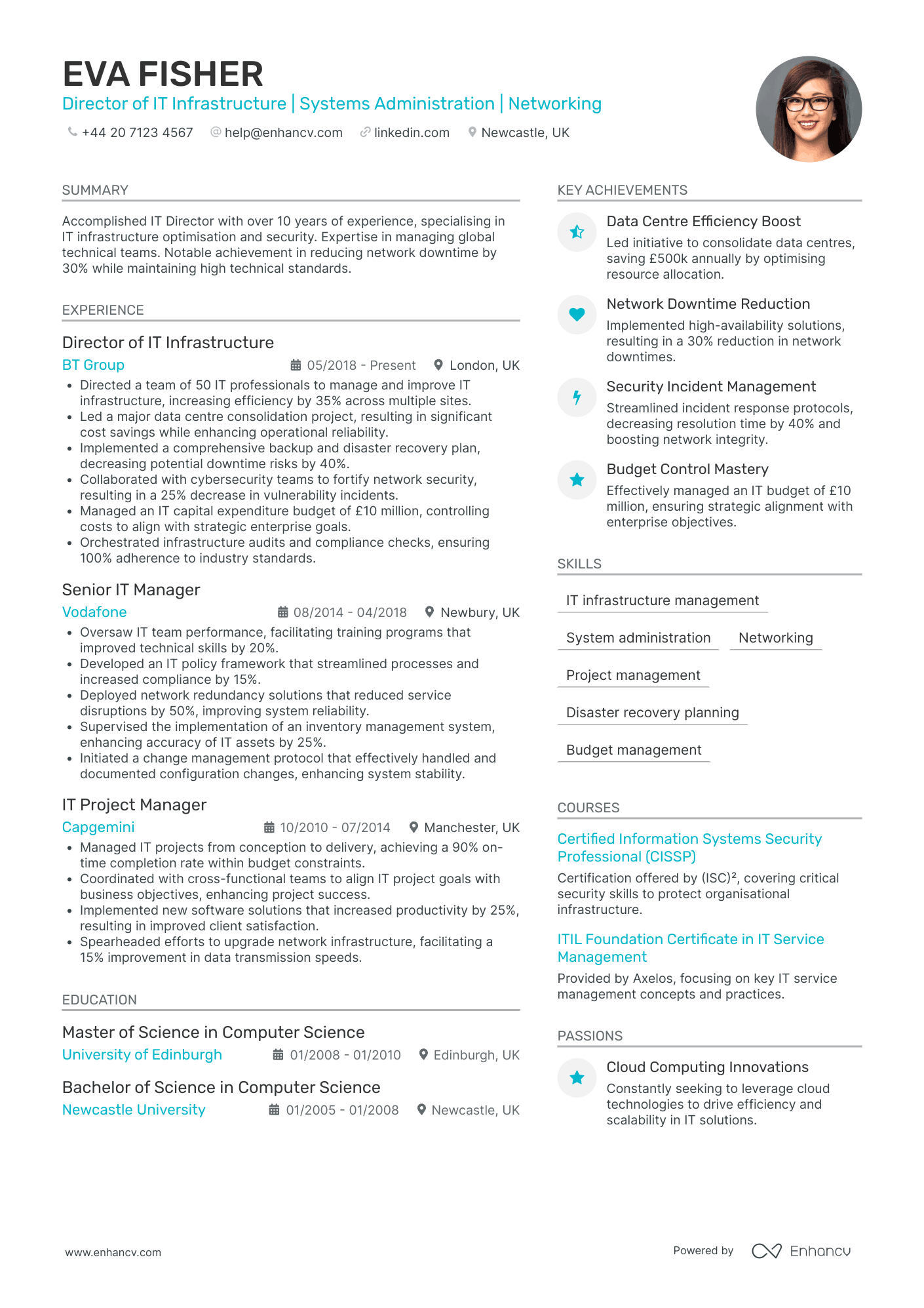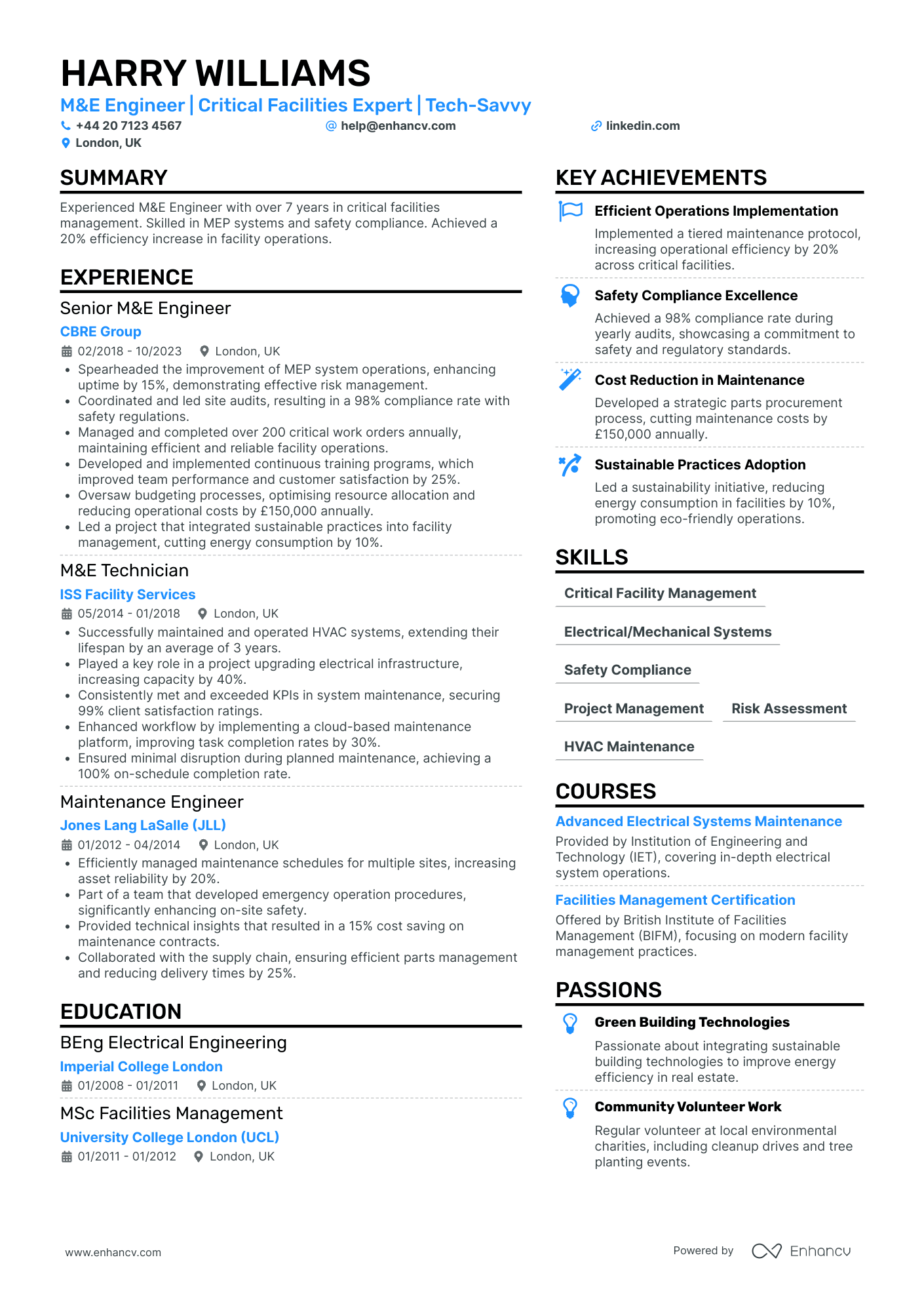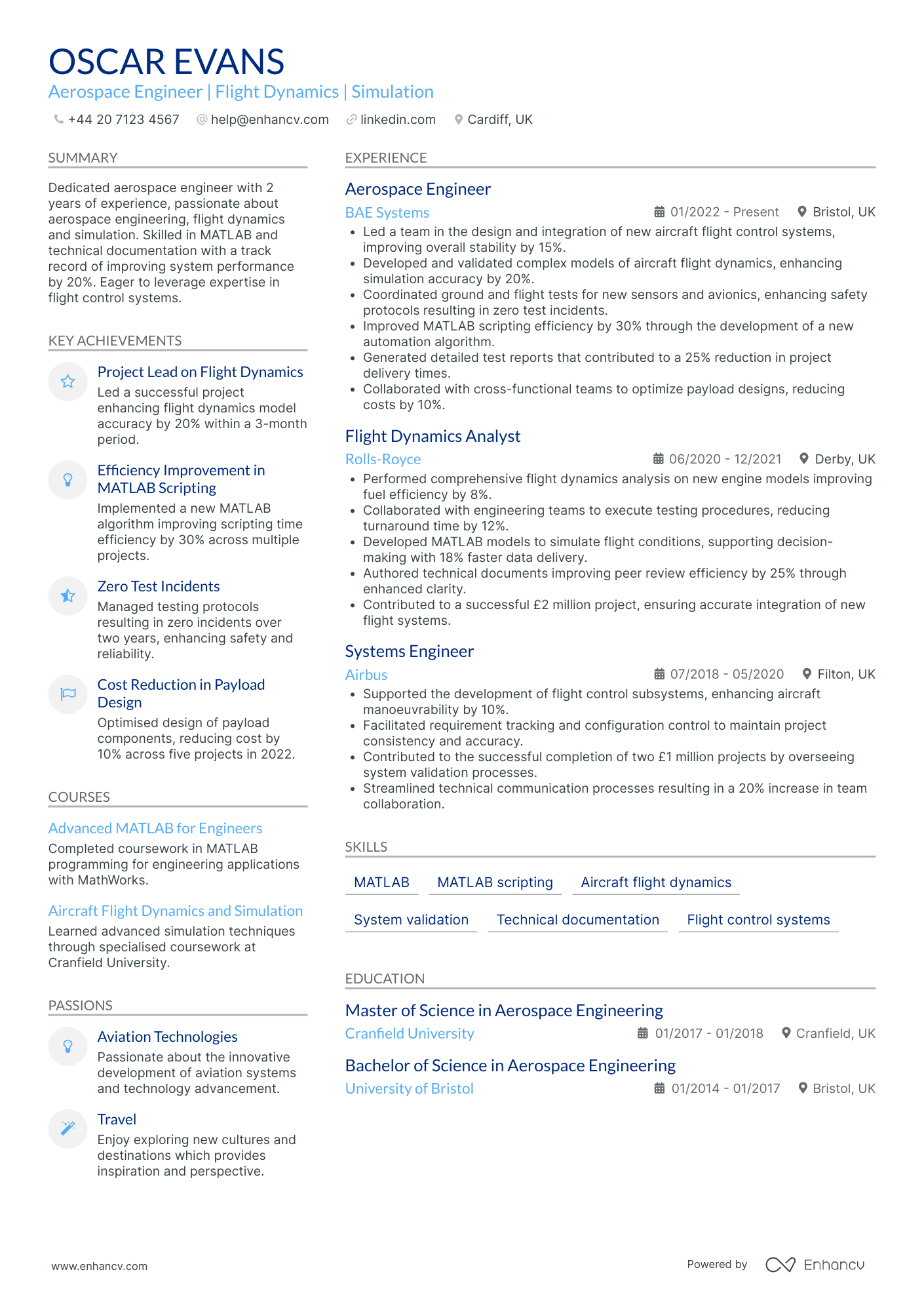Crafting a CV that effectively highlights your intricate project management skills and technical expertise can be an imposing challenge for you as an infrastructure engineer. Our guide offers tailored advice on refining your CV to showcase your strengths and successfully navigate through the complexities of your profession.
- Applying best practices from real-world examples to ensure your profile always meets recruiters' expectations;
- What to include in your work experience section, apart from your past roles and responsibilities?
- Why are both hard and soft skills important for your application?
- How do you need to format your CV to pass the Applicant Tracker Software (ATS) assessment?
If you're writing your CV for a niche infrastructure engineer role, make sure to get some inspiration from professionals:
Resume examples for infrastructure engineer
By Experience
Senior Infrastructure Engineer
- Progressive Career Growth - Jacob Roberts' career trajectory reflects consistent advancement in the field of infrastructure engineering. Starting from a System Administrator role, he has progressed to a Senior Infrastructure Engineer position, indicating his capability to take on more responsibility and adapt to industry changes. This growth highlights his dedication to professional development and increased expertise in cloud and network solutions.
- Technical Expertise and Industry-Specific Tools - The CV highlights Jacob's profound knowledge in industry-specific tools and methodologies, such as VMware, Cisco UCS, and Veeam. This technical depth is complemented by achievements in implementing comprehensive cloud and network solutions, showcasing his capacity to leverage technology for increased efficiency and system reliability.
- Impactful Achievements and Business Relevance - Jacob's experience is marked by significant accomplishments with quantifiable impacts, such as a 25% increase in system efficiency and a 40% reduction in recurring incidents. These achievements underscore his ability to drive operational improvements that align with business goals, ensuring enhanced service delivery and client satisfaction.
Junior Infrastructure Engineer
- Clear structure with comprehensive detail - The CV is well-organized, with distinct sections for each facet of professional life, allowing easy navigation. Important details like project impacts and skill sets are concisely presented, ensuring clarity without overwhelming the reader.
- Strong career progression in technical roles - Sienna's career trajectory illustrates a solid progression from IT Support Specialist to Junior Infrastructure System Engineer. This growth, combined with relevant technical internships, underscores her dedication to the field of infrastructure and algorithmic trading.
- Emphasis on cross-functional collaboration and innovation - The CV highlights experiences where Sienna collaborated across teams to improve trading platforms, reflecting valuable cross-functional skills. Her proactive approach in system innovation demonstrates adaptability and technical adeptness, contributing significantly to company enhancements.
Lead Infrastructure Engineer
- Structured Content Presentation - The CV stands out for its organized structure, making it easy for readers to identify key information. Each section is clearly marked, providing concise yet comprehensive details about the candidate’s experiences, skills, education, and achievements, facilitating quick access to pertinent information.
- Clear Career Progression and Growth - Isaac Scott’s career trajectory demonstrates significant growth, from a Pipeline Design Engineer to a Lead Infrastructure Engineer. This progression illustrates a steady rise in responsibilities, showcasing his capability to assume more complex and leadership-oriented roles over time.
- Emphasis on Leadership and Mentoring Skills - The CV highlights Isaac’s aptitude for leadership and mentorship, which is critical in his current role. By fostering a supportive learning environment and enhancing team performance, Isaac’s ability to lead and develop junior engineers is a testament to his dedication to team development and leadership excellence.
By Role
Cloud Infrastructure Engineer
- Impressive Career Progression - Rosie's journey from Systems Administrator to Cloud Infrastructure Engineer showcases a clear and strategic career trajectory. Each role builds on the last, demonstrating growth in responsibility and technical expertise, particularly in cloud technologies and infrastructure optimizations.
- Rich Technical Proficiency - The CV demonstrates a strong command of industry-specific tools and methodologies, such as Azure, VMWare, Terraform, and SIEM Technologies. This rich technical depth allows Rosie to effectively optimize systems and lead complex cloud migrations, proving her as a highly-skilled candidate in cloud infrastructure engineering.
- Impactful Achievements with Business Relevance - Beyond just numbers, Rosie's accomplishments reveal significant business impacts. For instance, reducing operational costs by 25% and enhancing system performance by 30% underscore her ability to apply technical solutions with profound financial and operational benefits for her employers.
DevOps Infrastructure Engineer
- Strategically Structured and Concise Presentation - The CV is formatted with clarity and succinctness, ensuring easy navigation through sections that highlight key information. Each section is direct and organized, making it easy for potential employers to quickly identify the candidate's qualifications and experience.
- Demonstrates Robust Career Progression - The CV outlines a clear career trajectory, showcasing promotions from an IT Infrastructure Engineer to a Senior DevOps Engineer. This growth indicates a solid development in expertise and increasing responsibilities, reflecting dedication and an upward movement within significant industry players like HSBC, Barclays, and BT Group.
- Rich Technical Depth with Industry-Specific Tools - Highlighted throughout the CV are specialized technologies and methodologies such as Azure DevOps, Terraform, and Infrastructure as Code (IaC), evidencing the candidate's technical proficiency. The inclusion of these tools underscores a deep understanding of current industry demands and trends in cloud infrastructure management.
Network Infrastructure Engineer
- Clear and logical structure - The CV prioritizes readability with a well-organized layout, separating personal details, professional experience, education, and skills into distinct sections. This structure allows for easy navigation and ensures that the most important information is accessible and comprehensible at a glance.
- Consistent career growth - The career trajectory outlined demonstrates impressive professional advancement, highlighting a series of well-earned promotions from junior roles to senior management positions. This progression reflects the candidate's dedication to personal development and their ability to adapt to increased levels of responsibility.
- Demonstrates industry-specific mastery - There is a strong focus on industry-specific tools and methodologies. The CV details the candidate's proficiency with advanced software and techniques, such as the use of Agile project management and data analysis tools, underscoring a deep technical understanding of the field.
IT Infrastructure Engineer
- Insightful Career Growth - The CV showcases an impressive career trajectory from a Network Systems Analyst to a Senior Network Engineer. Each role demonstrates an increase in responsibility and scope, indicating Thomas Walker's upward momentum and leadership within the competitive field of network infrastructure and security. Working with renowned companies like BAE Systems and Lockheed Martin highlights his commitment to advancing in complex, high-stakes environments.
- Comprehensive Technical Expertise - A standout feature of the CV is the candidate's extensive expertise in critical industry tools and methodologies such as Cisco products, WAN/LAN/WLAN configurations, and firewall solutions, coupled with significant project management capabilities in IT systems. This technical depth showcases the candidate’s ability to not just manage, but also innovate, optimize, and secure complex network systems, making him particularly valuable in any technologically advanced setting.
- Versatile Skills and Leadership - Thomas Walker’s CV highlights a strong blend of technical and leadership skills, demonstrated by achievements like leading infrastructure projects to enhance network security and spearheading training programs for technical staff. These initiatives have led to measurable improvements in operational efficiency and security, underscoring his impact within organizations and his dedication to effective team management and mentorship.
By Industry
Infrastructure Engineer in Telecommunications
- Structured Clarity and Conciseness - Amelia Murphy’s CV is well-organized and uses concise language to convey a wealth of information efficiently. The clear headers and concise bullet points in each section allow quick navigation and understanding of her qualifications and achievements.
- Impressive Career Growth in Technical Depth - The CV reflects a career trajectory focused on increasing technical responsibility and expertise in telecommunications engineering. Starting as a Telecom Systems Analyst and advancing to positions with more specialization and leadership at Siemens Energy and National Grid, Amelia shows a robust career progression.
- Technical Mastery and Specific Methodologies - Her CV highlights specialized industry tools and methodologies, demonstrating technical depth in SCADA protocols, fibre optic networks, and GPS time synchronization systems. This expertise is crucial for her roles, showcasing her ability to drive significant improvements in communications infrastructure.
Infrastructure Engineer in Healthcare
- Strategic Career Advancement - Joshua's career trajectory is marked by a steady progression from a Desktop Support Engineer to a Staff Desktop Support Engineer, demonstrating continuous growth and increasing responsibility within the IT sector. The progression highlights his advancement into leadership roles, reflecting his growing expertise and his capacity to lead larger projects and teams effectively.
- Technical Expertise in Healthcare IT - Joshua's CV showcases a unique combination of tools and methodologies specific to healthcare IT, such as MECM, Intune, and BitLocker. His experience at Medtronic and Siemens Healthineers illustrates his deep involvement in healthcare technology, indicating a specialized skill set that effectively addresses industry-specific challenges and contributes to enhanced healthcare delivery.
- Impactful Project Achievements - The detailed achievements section emphasizes Joshua's ability to lead projects that drive significant business outcomes, such as the "Global MECM Deployment Project" and "Wide-Scale Windows 10 Migration." These accomplishments not only highlight his technical prowess but also demonstrate his strategic impact on improving organizational efficiency, security, and user satisfaction.
Infrastructure Engineer in Financial Services
- Logical and clear content presentation - The CV is structured in a way that offers clarity and flow, moving seamlessly from contact information to experience, education, skills, and achievements. Each section is concise, yet detailed enough to give a complete picture without overwhelming the reader, focusing on relevant aspects crucial for the role of a Software Engineer in fund administration.
- Impressive career trajectory and growth - The candidate has shown a consistent upward career progression, moving from a Junior Software Developer at Goldman Sachs to a Senior Software Engineer at BlackRock. This trajectory highlights their ability to advance and adapt within leading financial institutions, demonstrating both their industry expertise and their dedication to professional development.
- Distinctive use of industry-specific tools and methodologies - The CV emphasizes a strong command of tools like Java, Kotlin, and PostgreSQL, which are directly applicable to fund administration and risk management. Additionally, the use of methodologies such as automation and database optimization showcases a deep technical proficiency and an ability to apply technical solutions to enhance financial services.
Infrastructure Engineer in Cybersecurity
- Detailed career progression and industry specialization - Lucas Adams' journey from a Junior Security Engineer to a Cybersecurity Engineer highlights a clear trajectory of growth and specialization in cybersecurity and cloud security. The steady progression through reputable companies like Coinbase, Revolut, and BlockFi underscores his deepening expertise and increasing responsibility within the industry.
- Integration of cutting-edge security methodologies - The CV showcases a strong emphasis on implementing contemporary cybersecurity frameworks such as ZeroTrust architecture and SSDLC, which are critical in today's evolving security landscape. The use of sophisticated tools and technologies, like Python, Node.js, and IaC, suggests a high level of technical depth and a solid grasp of advanced industry-specific practices.
- Proven impact on organizational security posture - Lucas' achievements are well-documented with quantifiable impacts on business operations, such as a 40% reduction in threat vectors and a 30% decrease in security incidents. These accomplishments not only underline his technical proficiency but also demonstrate his ability to apply knowledge effectively to improve overall security and compliance, making significant contributions to corporate business objectives.
Infrastructure Engineer in Retail
- Comprehensive career evolution - Ethan's CV demonstrates a clear trajectory of advancement through increasingly responsible roles in renowned companies. Beginning as an IT Project Manager at British Airways, transitioning to a Senior Project Manager at Tesco, and rising to the position of Engineering Project Manager at Amazon, each step reflects significant professional growth aligned with technical expertise and leadership.
- Strategic impact through achievements - This CV effectively details Ethan's capacity to deliver broad business impacts. It highlights how strategic initiatives like advanced risk management and agile process implementation provided substantial benefits, such as the £100,000 annual savings for Tesco and increased user engagement and deployment efficiency at Amazon.
- Emphasis on collaborative leadership - Ethan’s experience section consistently showcases his strong leadership and team-building qualities. He led cross-functional teams, enhanced communication to reduce misunderstandings, and acted as a conflict resolution expert. These examples emphasize his capability to inspire and manage diverse teams effectively, driving successful project outcomes and fostering a harmonious work environment.
Infrastructure Engineer in Manufacturing
- Structured and Comprehensive Display - The CV is structured with clear sections including experience, education, skills, courses, achievements, languages, and passions, ensuring that each facet of the candidate’s profile is easily accessible and presented concisely. This logical organization aids in quickly grasping the depth and breadth of Daniel Baker's career and aspirations.
- Dynamic Career Advancement - Daniel Baker exhibits a robust career trajectory, showcasing significant growth from a Junior Manufacturing Engineer to a Senior Manufacturing Engineer at notable companies like BAE Systems and Airbus. This progression reflects a deepening expertise in digital manufacturing systems and leadership capabilities, evidencing his rise within the aerospace and manufacturing sectors.
- Technical Prowess in Digital Systems - The CV highlights Baker’s adeptness with industry-specific methodologies and tools like Advanced Product Quality Planning and Lean Manufacturing. Their ability to implement digital systems and spearhead projects leading to substantial efficiency and cost improvements underscores a strong engagement with cutting-edge manufacturing technologies.
Infrastructure Engineer in Education
- Clear and Structured Presentation - Grace Bailey’s CV excels in clarity and structure, making it effortless for the reader to navigate through various sections. The logical flow emphasizes career progression, skills, and achievements, cohesively linking her expertise in technical writing with her educational background in data science and bioinformatics.
- Distinctive Career Progression in Technical Domains - Grace's career trajectory showcases a steady progression from Documentation Specialist to Senior Technical Writer, reflecting her growing responsibilities and leadership in software documentation and data analysis fields. This path highlights her ability to adapt and excel in complex technical environments, particularly within the genomics and biotech industries.
- Integration of Innovative Methodologies - The CV distinguishes itself by detailing Grace’s proficiency with industry-specific methodologies such as ‘Docs-as-Code’ and her integration of automation tools. These elements underline her commitment to enhancing efficiency and accuracy in documentation, paving the way for improved product usability and communication across departments.
Infrastructure Engineer in Public Sector
- Structured and Concise Information - The CV effectively presents information in a structured format, making it easy to digest the candidate's experience and skills. Each section is clearly delineated, enhancing readability and allowing for straightforward assessment of qualifications and achievements.
- Demonstrated Industry Growth and Expertise - William Hall's career trajectory is marked by steady progression from IT Systems Engineer to Senior Cloud Architect, reflecting significant industry experience and expertise in cloud architecture and migration. This trajectory showcases his capability to adapt and maintain relevance in a fast-evolving tech sector.
- Technical Depth in Cloud Solutions - The CV underscores specific industry-relevant elements, including William's proficiency in cloud technologies and methodologies like cloud native architecture, containerization, and virtualization. His contributions to significant projects, such as reducing vulnerabilities and improving operational efficiencies, highlight his technical impact and alignment with career goals.
Infrastructure Engineer in Construction
- Comprehensive Career Progression - Max Wright’s CV outlines a clear, upward trajectory in the construction engineering domain, transitioning smoothly from an Assistant Project Engineer to a more strategic role as a Construction Project Engineer at Babcock International in the nuclear sector. This path not only demonstrates growth in responsibility but also showcases his ability to handle larger projects and lead teams effectively.
- Robust Integration of Industry-Specific Tools - The CV effectively highlights Max’s command over critical project management tools and methodologies like FIDIC, NEC, and JCT, alongside software proficiency with Microsoft Project and Primavera P6. This technical acumen is paramount in the nuclear sector where precise project controls are crucial, emphasizing his readiness to handle complex industry demands.
- Solid Emphasis on Leadership and Stakeholder Engagement - Beyond technical skills, Max’s leadership capabilities are well-articulated, showcasing his role in pioneering stakeholder communication systems and increasing team coordination significantly. These soft skills are vital for optimizing project alignment and ensuring the satisfaction and trust of diverse project stakeholders, as indicated by a 95% satisfaction rate.
Infrastructure Engineer in Energy
- Structured Categorization with Clarity and Focus - The CV's layout is meticulously organized, starting with contact information clearly followed by well-separated sections like experience, education, skills, and achievements. Each segment is concise, ensuring quick readability, which is essential for busy recruiters and hiring managers.
- Detailed Career Growth and Industry Exposure - Henry's career progression is strategically highlighted, starting from his role as an Electrical Systems Engineer and advancing to Senior Electrical Design Engineer. This trajectory indicates steady growth and specialization in the renewable energy sector, reinforced by his progression across reputable firms like WSP, Arup, and Siemens.
- Demonstrated Achievements with Significant Business Impact - The achievements mentioned are not merely numerical but are tied to meaningful business outcomes, such as the 20% reduction in energy costs and enhancing team productivity by 15%. These accomplishments reflect Henry's ability to influence the company's bottom line significantly.
Infrastructure Engineer in Transport
- Clear and Strategic Presentation - The CV is structured in a highly organized manner, offering a clear presentation that helps the reader easily navigate the candidate's qualifications. Each section is concise yet comprehensive, allowing quick access to key information without overwhelming detail, which is crucial for upper-management roles.
- Progressive Career Growth - Eva Fisher’s progression from an IT Project Manager to Director of IT Infrastructure reflects a robust career trajectory with increasing responsibility and influence. This advancement within prominent companies such as BT Group and Vodafone demonstrates her capacity for leadership and ability to manage larger teams and budgets over time, signifying significant professional development.
- Impactful Achievements with Business Relevance - The CV highlights achievements that are crucial for business success, such as reducing network downtime by 30% and saving £500k annually through data centre optimization. These accomplishments are not only indicative of technical prowess but also underline Eva's impact on cost-saving and operational efficiency, illustrating her strategic value to potential employers.
Infrastructure Engineer in Data Centres
- Clear Structure and Conciseness - The CV is well-organized with clearly defined sections, allowing the reader to easily navigate through Harry Williams’s experience and qualifications. The use of concise bullet points ensures that key achievements and responsibilities are quickly conveyed without overwhelming detail.
- Demonstrated Career Growth - Harry’s progression from a Maintenance Engineer at Jones Lang LaSalle to a Senior M&E Engineer at CBRE Group indicates a clear trajectory of growth and increasing responsibility. Each position builds upon the previous experience, showcasing an upward career path within the facilities management domain.
- Technical Depth in Critical Facilities - The CV highlights Harry’s expertise in managing critical MEP systems and his ability to implement cutting-edge solutions like sustainable practices and a cloud-based platform, reflecting deep technical knowledge specific to the engineering domain. This technical competency is further reinforced by certifications and industry-specific courses.
Infrastructure Engineer in Aerospace
- Consistent career growth and industry involvement - Oscar Evans' career progression is clearly defined, showcasing a trajectory from a Systems Engineer at Airbus to an Aerospace Engineer at BAE Systems. The consistent involvement with prestigious companies like Rolls-Royce and Airbus indicates a career path marked by steady growth and industry relevance.
- Robust technical skills with industry-specific applications - The CV highlights Evans' proficiency with industry-relevant tools such as MATLAB, which is crucial for flight dynamics and simulation modeling. His ability to enhance system performance and simulation accuracy by substantial percentages underscores his technical depth and understanding of aerospace engineering nuances.
- Effective collaboration and leadership in a complex field - The CV details Evans’ experience leading teams and managing cross-functional collaboration efforts, which is significant in the aerospace field where complex projects involve multidisciplinary teams. His role in coordinating flight tests and optimizing payload designs reflects his leadership skills and adaptability to diverse project demands.
Formatting your infrastructure engineer CV to meet the role expectations
Staring at the blank page for hours on end, you still have no idea how you should start your professional infrastructure engineer CV. Should you include more colours, two columns, and which sections? What you should remember about your CV format is this - ensure it's minimalistic and doesn't go over the top with fancy fonts and many colours. Instead, focus on writing consistent content that actually answers the job requirements. But, how about the design itself :
- Use the reverse chronological order to showcase your experience, starting with your most recent role;
- Include your contact details (email address, phone number, and location) - and potentially your professional photo - in the header;
- Must-have CV sections include summary or objective, experience, education, and skills: curate the ones that fit your profile;
- Your professional infrastructure engineer CV should be between one-to-two pages long: select the longer format if you have more experience.
A little bit more about your actual CV design, ensure you're using:
- plenty of serif or sans serif font (e.g. Montserrat, Exo 2, Volkhov) as they are Applicant Tracker System (ATS) compliant. Avoid the likes of Arial and Times New Roman because most candidates' CVs are in this typography.
When submitting your CV, are you still not sure what format it should be? Despite the myth that has been circling around, most modern ATS systems are perfectly capable of reading PDFs. This format is an excellent choice as it keeps all of your information intact.
PRO TIP
Use bold or italics sparingly to draw attention to key points, such as job titles, company names, or significant achievements. Overusing these formatting options can dilute their impact.
The top sections on a infrastructure engineer CV
- Professional Summary highlights expertise in managing critical infrastructure and systems.
- Relevant Experience demonstrates a history of successful infrastructure projects and maintenance.
- Technical Skills show proficiency with necessary tools and technologies for infrastructure management.
- Certifications & Education underline formal qualifications and specialised training in the field.
- Projects & Accomplishments detail specific achievements and contributions to infrastructure solutions.
What recruiters value on your CV:
- Highlight your experience with managing and scaling robust IT infrastructure, detailing how you've worked with both on-premises and cloud-based solutions to ensure high availability and reliability.
- Mention specific technologies and platforms you are proficient with, such as AWS, Azure, Kubernetes, or Terraform, and how you've utilised them in previous projects to optimise infrastructure performance.
- Include any automation tools and scripting languages you’re skilled in, like Ansible, Puppet, Chef, or Python, and describe how you've used them to streamline deployment processes and reduce human error.
- Detail your experience with infrastructure as code (IaC), providing examples of how you've enforced consistency and accountability in the environment's setup phases.
- Emphasise your ability to collaborate with development teams, showcasing your experience with CI/CD pipelines and how you've contributed to the DevOps culture by aligning infrastructure with business needs.
Recommended reads:
Tips and tricks on writing a job-winning infrastructure engineer CV header
The CV header is the space which most recruiters would be referring most often to, in the beginning and end of your application. That is as the CV header includes your contact details, but also a headline and a professional photo. When writing your CV header:
- Double-check your contact details for spelling errors or if you've missed any digits. Also, ensure you've provided your personal details, and not your current work email or telephone number;
- Include your location in the form of the city and country you live in. If you want to be more detailed, you can list your full address to show proximity to your potential work place;
- Don't include your CV photo, if you're applying for roles in the UK or US, as this may bias initial recruiters' assessments;
- Write a professional headline that either integrates the job title, some relevant industry keywords, or your most noteworthy achievement.
In the next part of our guide, we'll provide you with professional CVs that showcase some of the best practices when it comes to writing your headline.
Examples of good CV headlines for infrastructure engineer:
- Senior Infrastructure Engineer | Cloud Solutions Specialist | AWS Certified | 10+ Years’ Experience
- Junior Infrastructure Technician | Network Support Enthusiast | CCNA | 2 Years on Job
- Lead Infrastructure Architect | Data Centre Expert | ITIL & PMP | 15-Years' Leadership
- Mid-Level Infrastructure Consultant | Cybersecurity Focus | CISSP | 5 Years Progressive Experience
- Principal Systems Engineer | Virtualisation & Automation Pro | VCP-DCV | 12 Years Industry Expertise
- Infrastructure Operations Manager | DevOps Advocate | Microsoft Certified | 8 Years Building Teams
Choosing your opening statement: a infrastructure engineer CV summary or objective
At the top one third of your CV, you have the chance to make a more personable impression on recruiters by selecting between:
- Summary - or those three to five sentences that you use to show your greatest achievements. Use the CV summary if you happen to have plenty of relevant experience and wish to highlight your greatest successes;
- Objective - provides you with up to five sentences to state your professional aims and mission in the company you're applying for
CV summaries for a infrastructure engineer job:
- Seasoned Infrastructure Engineer with over 8 years of experience specialising in cloud services deployment, network security, and data centre management. Proficient with AWS, Cisco technologies, and automation using Ansible. Instrumental in reducing system downtime by 30% at TechSolve Inc. through strategic infrastructure revamps.
- Dynamic professional with a decade's tenure in software development, transitioning into Infrastructure Engineering. Holds deep expertise in Python, system architecture, and a proven track record of leading successful cross-functional project teams. Seeking to leverage coding prowess and analytical skills to advance into cloud infrastructure and server administration.
- Diligent Aerospace Engineer making a career transition to Infrastructure Engineering, intrigued by the challenges of IT systems management. With strong analytical skills and a solid understanding of physics principles, looking to apply systematic problem-solving approaches to optimise and secure enterprise IT environments.
- Proactive individual with 5 years of experience as an IT Support Specialist eager to contribute to the world of Infrastructure Engineering. Adept at network troubleshooting, hardware maintenance, and providing high-quality support. Exemplified commitment to service excellence by achieving a 98% satisfaction rate from client feedback surveys.
- Eager to embark on an Infrastructure Engineering career with a focus on sustainability and cutting-edge technology. With a passion for learning and a recent Bachelor’s degree in Computer Sciences, committed to bringing fresh insights and a willingness to gain hands-on experience in managing and protecting vital IT systems.
- Seeking to integrate theoretical knowledge and a heightened interest in advanced technology into the practical domain of Infrastructure Engineering. With an academic background in Information Technology and relevant internship experience, driven to hone skills in network architecture and cloud solutions in a hands-on, dynamic environment.
Narrating the details of your infrastructure engineer CV experience section
Perhaps you've heard it time and time again, but, how you present your experience is what matters the most. Your CV experience section - that details your work history alongside your accomplishments - is the space to spotlight your unqiue expertise and talents. So, avoid solely listing your responsibilities, but instead:
- adverts' keywords and integrate those in your experience section;
- Use your CV to detail how you've been promoted in the past by including experience in the reverse chronological order.
Before you start writing your infrastructure engineer CV experience section, dive into some industry-leading examples on how to structure your bullets.
Best practices for your CV's work experience section
- Designed and implemented scalable, high-availability infrastructure solutions that supported business objectives and ensured 99.9% uptime, utilising cloud services such as AWS, Azure, or Google Cloud.
- Managed and optimized server infrastructure for a diverse range of environments including Windows, Linux, UNIX, with an emphasis on automation and configuration management tools like Ansible, Puppet, or Chef.
- Collaborated with development teams to streamline deployment processes, incorporating CI/CD pipelines using Jenkins, Travis CI, or GitLab CI to increase release efficiency and reduce rollback incidents.
- Developed and maintained comprehensive disaster recovery plans, conducted regular testing to confirm data integrity, and rapidly responded to critical incidents to minimise service disruption. Led cross-functional teams in the strategic planning and execution of network architecture upgrades, focusing on security, scalability, and cost-effectiveness.
- Led the migration of on-premises legacy systems to AWS cloud infrastructure, cutting operational costs by 30%.
- Engineered and maintained reliable and secure network infrastructure, reducing downtime by 15% and enhancing business continuity.
- Implemented automated provisioning tools like Terraform and Ansible, improving deployment efficiency by 40%.
- Designing and deploying scalable server and network architectures for a global user base leading to a 20% increase in service availability.
- Spearheading the adoption of containerization using Docker and Kubernetes, resulting in a 50% acceleration in app development cycle times.
- Orchestrated a comprehensive disaster recovery plan that decreased potential data recovery times by over 60%.
- Managed the complete data center overhaul project that enhanced processing capacity by 2.5x.
- Implemented strict security protocols and measures that led to a 70% reduction in vulnerability exploits.
- Developed and rolled out a robust monitoring system that improved network uptime to 99.9%.
- Pioneered the application of Infrastructure as Code (IaC) techniques, shortening the infrastructure provision time from weeks to hours.
- Optimized data storage and management, achieving cost savings of $200,000 annually on storage.
- Initiated and managed cross-functional teams for the deployment of critical infrastructure, completing projects 25% ahead of schedule.
- Modernized network infrastructure by integrating next-generation firewalls and advanced threat protection systems.
- Collaborated with software development teams to create a CI/CD pipeline that reduced time-to-market by 20%.
- Led the technical side of vendor negotiations to reduce IT infrastructure expenses by 15% through selective sourcing.
- Upgraded the core routing and switching infrastructure to improve bandwidth throughput by 100 Gbps substantially.
- Expertly managed vendor relationships which enhanced the quality of support services and equipment by 30%.
- Deployed a centralized management system for network devices to simplify administrative tasks and reduce human error.
- Championing the development of a hybrid cloud environment that enables fluid workload migration and optimized cost management.
- Driving automation in infrastructure management that has already reduced manual intervention by 60%.
- Evaluating emerging technologies to align infrastructure growth with strategic business initiatives.
- Performed extensive research and development, resulting in the implementation of an enterprise SD-WAN solution that improved network performance by 40%.
- Masterminded the creation of custom scripts to automate infrastructure tasks, boosting productivity across the IT department by 25%.
- Coordinated the seamless transition of the mobile workforce to a secure remote access solution that maintained 100% compliance with industry standards.
- Upgraded and managed a 10,000+ endpoint environment which demanded meticulous planning and execution to ensure zero business disruption.
- Deployed network monitoring solutions enabling proactive issue resolution and boasted a 98% incident detection rate.
- Instituted a comprehensive training program for IT staff on new technologies that reduced onboarding time by 50%.
- Designed and implemented an IT service continuity plan that reduced potential downtime costs by up to $1 million per incident.
- Enhanced application deployment processes through the introduction of microservices, improving scalability and resilience.
- Developed a company-wide BYOD policy and the accompanying security infrastructure to protect corporate data on personal devices.
Swapping your professional experience (when you have none) with skills and more
Never underestimate the importance of relevancе when it comes to your infrastructure engineer CV. Even if you don't happen to have much or any standard (full-time contract) professional experience, this doesn't mean you shouldn't apply for the role. Instead of a bespoke CV experience section:
- Showcase more prominently any internships, part-time roles, and volunteer experience that are applicable to the role and have taught you job-crucial skills;
- Feature a strengths or achievements section with your transferrable skills or talents you've obtained thanks to your work or life experience;
- Write an objective statement that clearly outlines your values as a candidate and defines your career ambitions;
- List your education or certificates that match the job profile closer to the top of your CV.
Recommended reads:
PRO TIP
Talk about any positive changes you helped bring about in your previous jobs, like improving a process or helping increase efficiency.
Describing your unique skill set using both hard skills and soft skills
Your infrastructure engineer CV provides you with the perfect opportunity to spotlight your talents, and at the same time - to pass any form of assessment. Focusing on your skill set across different CV sections is the way to go, as this would provide you with an opportunity to quantify your achievements and successes. There's one common, very simple mistake, which candidates tend to make at this stage. Short on time, they tend to hurry and mess up the spelling of some of the key technologies, skills, and keywords. Copy and paste the particular skill directly from the job requirement to your CV to pass the Applicant Tracker System (ATS) assessment. Now, your CV skills are divided into:
- Technical or hard skills, describing your comfort level with technologies (software and hardware). List your aptitude by curating your certifications, on the work success in the experience section, and technical projects. Use the dedicated skills section to provide recruiters with up to twelve technologies, that match the job requirements, and you're capable of using.
- People or soft skills provide you with an excellent background to communicate, work within a team, solve problems. Don't just copy-paste that you're a "leader" or excel at "analysis". Instead, provide tangible metrics that define your success inusing the particular skill within the strengths, achievements, summary/ objective sections.
Top skills for your infrastructure engineer CV:
Cloud Computing (AWS, Azure, GCP)
Server Administration (Windows, Linux)
Virtualisation Technologies (VMWare, Hyper-V)
Containerisation (Docker, Kubernetes)
Networking (TCP/IP, VPN, DHCP, DNS)
Infrastructure as Code (Terraform, Ansible)
Scripting (PowerShell, Bash)
Storage Solutions (SAN, NAS, Object Storage)
Cybersecurity Practices
Database Administration (SQL, NoSQL)
Problem-Solving
Collaboration
Project Management
Communication
Analytical Thinking
Time Management
Adaptability
Attention to Detail
Leadership
Customer Service Orientation
PRO TIP
Focus on describing skills in the context of the outcomes they’ve helped you achieve, linking them directly to tangible results or successes in your career.
Education and more professional qualifications to include in your infrastructure engineer CV
If you want to showcase to recruiters that you're further qualified for the role, ensure you've included your relevant university diplomas. Within your education section:
- Describe your degree with your university name(-s) and start-graduation dates;
- List any awards you've received, if you deem they would be impressive or are relevant to the industry;
- Include your projects and publications, if you need to further showcase how you've used your technical know-how;
- Avoid listing your A-level marks, as your potential employers care to learn more about your university background.
Apart from your higher education, ensure that you've curated your relevant certificates or courses by listing the:
- name of the certificate or course;
- name of the institution within which you received your training;
- the date(-s) when you obtained your accreditation.
In the next section, discover some of the most relevant certificates for your infrastructure engineer CV:
PRO TIP
If there's a noticeable gap in your skillset for the role you're applying for, mention any steps you're taking to acquire these skills, such as online courses or self-study.
Recommended reads:
Key takeaways
Impressing recruiters with your experience, skill set, and values starts with your professional infrastructure engineer CV. Write concisely and always aim to answer job requirements with what you've achieved; furthermore:
- Select a simple design that complements your experience and ensures your profile is presentable;
- Include an opening statement that either spotlights your key achievements (summary) or showcases your career ambitions (objective);
- Curate your experience bullets, so that each one commences with a strong, action verb and is followed up by your skill and accomplishment;
- List your hard and soft skills all across different sections of your CV to ensure your application meets the requirements;
- Dedicate space to your relevant higher education diplomas and your certificates to show recruiters you have the necessary industry background.
